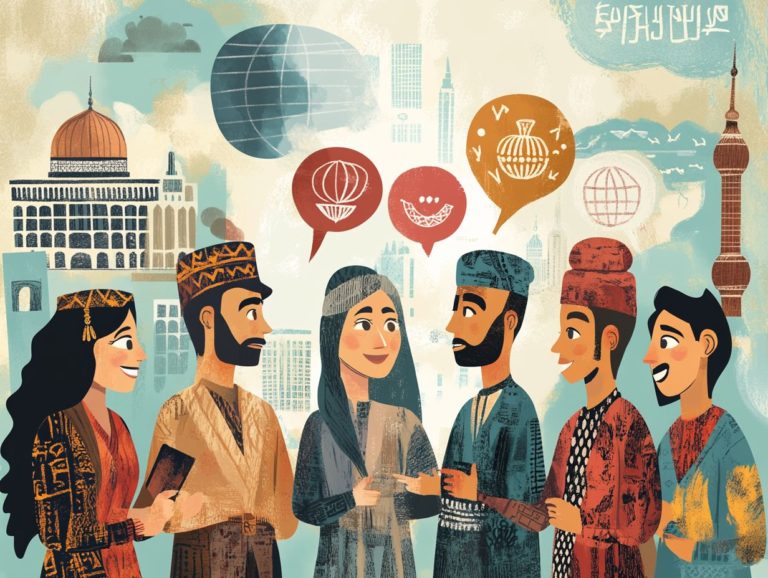The Importance of Learning Local Dialects
Language is more than just talking; it is a gateway to the intricate tapestry of culture and identity.
Immersing yourself in local dialects enhances your ability to connect with others and unlocks unique cultural experiences. The benefits are numerous, from enriching personal relationships to giving you a competitive edge in your career.
However, mastering local dialects comes with its own challenges. This article explores the importance of local dialects, the many great benefits they offer, and provides practical tips for overcoming the hurdles involved.
Engage with us to deepen your appreciation for linguistic diversity and gain respect for cultural nuances!
Contents
- Key Takeaways:
- The Significance of Learning Local Dialects
- Benefits of Learning Local Dialects
- Challenges of Learning Local Dialects
- Ways to Learn Local Dialects
- Cultural Etiquette and Respect
- Frequently Asked Questions
- What is the importance of learning local dialects?
- How does learning local dialects benefit me?
- Is it necessary to learn local dialects if I already speak the standard language?
- Can learning local dialects be difficult?
- Do I have to travel to a certain location to learn a local dialect?
- How can learning local dialects benefit future generations?
Key Takeaways:

- Discover how learning local dialects can deepen your understanding of diverse cultures.
- Unlock new friendships and professional opportunities by mastering local dialects.
- Learn effective methods and resources to overcome the challenges of learning local dialects while practicing cultural etiquette and respect.
The Significance of Learning Local Dialects
Mastering local dialects is essential for improving your communication skills and enhancing your travel experiences, especially if you study abroad in countries like France, Spain, or Germany.
Understanding the nuances of local languages allows you to connect meaningfully with native speakers. This deepens your cultural appreciation and enables more genuine interactions with locals.
This journey enriches your understanding of cultural values and creates opportunities for friendships that go beyond typical tourist encounters.
As the world becomes more connected, mastering a local language becomes an invaluable asset for anyone eager to engage fully with diverse cultures.
Benefits of Learning Local Dialects
Learning local dialects enriches both your personal and professional life. By improving your language skills, you enhance your interactions with locals, making daily activities during travel or expatriate life more enjoyable.
Grasping local customs and cultural values helps you fully immerse yourself in vibrant new experiences. This skill not only eases social interactions but also opens doors to professional opportunities in today’s interconnected job market, where cultural understanding is increasingly valued.
Improved Communication and Connection
Better communication is one of the most significant benefits of learning local dialects. It allows you to engage in deeper interactions and gain a richer understanding during your travels. When you practice a local language, you discover communication nuances that go beyond mere vocabulary, fostering genuine connections with native speakers.
This ability to grasp cultural expressions and local customs leads to more enriching interactions and unforgettable travel adventures, strengthening friendships and community ties.
Speaking a local dialect can bridge cultural divides, making it easier to navigate unfamiliar environments. For instance, if you learn basic Japanese phrases while visiting Japan, you might receive warm smiles and even spontaneous invitations to local festivals.
Engaging in conversations with locals in their language deepens your cross-cultural understanding, leading to exchanges that exceed typical tourist encounters.
These interactions often blossom into lasting friendships that extend well beyond your journey, showcasing how improved communication can enrich social connections and celebrate the beauty of diversity.
Start learning a local dialect today and transform your travel experiences!
Cultural and Professional Advantages

Learning local dialects has many cultural and professional advantages. This is especially true for those navigating expatriate life or seeking unique travel experiences.
Mastering local languages not only deepens your cultural appreciation but also gives you the power to navigate social landscapes with finesse. You gain valuable insights into local customs and traditions.
Language acquisition can greatly improve your career prospects, especially in fields where cross-cultural communication is key. Employers increasingly prioritize candidates with strong language skills and cultural understanding.
For instance, in industries like tourism, hospitality, and international business, being multilingual can distinguish you from your peers. In healthcare, understanding a patient’s preferred language can lead to better outcomes and foster trust.
Professionals in tech and global marketing often find that knowing another language unlocks opportunities for international collaborations, ensuring that their messaging resonates and is culturally relevant.
Thus, language learning not only enriches your personal interactions and travel experiences but also paves the way for substantial career advancements across diverse sectors.
Challenges of Learning Local Dialects
Learning local dialects opens up a treasure trove of benefits! However, it also poses various challenges that you ll need to navigate for successful language acquisition.
You might find yourself struggling with pronunciation, deciphering regional slang, and overcoming confidence barriers when it comes to speaking.
While this journey can feel daunting, armed with the right language resources and a commitment to consistent practice, you can effectively conquer these hurdles.
Embracing these challenges not only enhances your travel experiences but also deepens your connections with local communities.
Difficulties and Solutions
Language difficulties often emerge when you find yourself struggling with the different features of dialects, which can lead to potential communication barriers.
To navigate these challenges, use effective language practice techniques and available resources.
The subtleties of idiomatic expressions and regional slang can leave non-native speakers feeling bewildered. To overcome these hurdles, immerse yourself in a language-rich environment.
Frequent practice through conversations with native speakers will bolster your confidence and provide immediate feedback on your pronunciation and usage.
Joining local clubs, attending cultural festivals, or participating in volunteer work can create a vibrant social context where your language skills can truly thrive.
Such interactions will deepen your understanding of the language while helping you appreciate the cultural backgrounds that shape various communication styles.
Ultimately, this approach will enrich your overall language journey, transforming it into a rewarding experience.
Ways to Learn Local Dialects
You have a wealth of effective options for mastering local dialects, each offering a distinctive approach to language engagement and cultural immersion.
Whether you dive into textbooks, explore online courses, or indulge in cultural activities during your travels, you can customize your methods to align perfectly with your personal learning style.
Engaging in community interactions, attending local events, or practicing with native speakers can dramatically enrich your learning experience, granting you invaluable insights into local customs and expressions.
Don t miss out on opportunities to connect with local communities! Start your journey of learning local dialects today.
Unlocking Local Dialects: Your Guide to Learning

To truly master local dialects, you can explore a variety of methods and resources. These range from language apps to immersive cultural activities. Consider travel tips that encourage you to dive into daily life by exploring local markets or joining traditional celebrations. These experiences can significantly enhance your language learning.
Online resources, podcasts, and language exchange platforms provide invaluable opportunities for practice and direct interaction with native speakers. This creates a rich learning experience.
Engaging in local classes or workshops will help you discover pronunciation subtleties and slang. You’ll also connect with community members who can serve as informal tutors. For example, if you’re eager to understand a Southern American dialect, storytelling sessions at local libraries or casual coffee meetups with native speakers can be very helpful.
These immersive experiences deepen your understanding of dialectal variations and significantly boost your speaking confidence two essential elements for effective language acquisition.
Cultural Etiquette and Respect
Understanding cultural etiquette and respect is crucial when diving into local dialects. It enhances your communication and relationships with native speakers.
Every culture is woven with unique customs and values that shape interactions. Being aware of these nuances can elevate your travel experience.
By respecting local traditions and language, you enrich personal connections and gain a deeper appreciation for the culture and its identities.
Dos and Don’ts of Using Local Dialects
When engaging with local dialects, knowing the dos and don’ts is vital for showing cultural respect and improving your communication skills. Interacting with native speakers calls for sensitivity to local customs and an understanding of how language shifts across different contexts.
For instance, greeting someone with a local phrase can enhance your rapport and show your eagerness to connect. However, using slang without understanding its nuances may offend locals. Addressing elders or community leaders with the right level of formality shows respect; forgetting this can lead to misunderstandings and appear culturally insensitive.
Recognizing idioms or regional jokes can bridge gaps, while misusing them might leave you feeling excluded. Approach conversations with an open mind and a genuine willingness to learn, ensuring your interactions are both respectful and enriching.
Frequently Asked Questions
What is the importance of learning local dialects?

Learning local dialects opens doors to better conversations and deeper connections! It allows for improved communication and understanding within a community. It also helps preserve cultural heritage and traditions.
How does learning local dialects benefit me?
Learning local dialects can enhance your language skills and make you more culturally aware and adaptable. It may open up new job opportunities and improve your social interactions.
Is it necessary to learn local dialects if I already speak the standard language?
While it may not be necessary, learning local dialects greatly enriches your understanding of a culture and its people. It can also help you form deeper connections with those around you.
Can learning local dialects be difficult?
Like learning any new language, local dialects can be challenging but also fun and rewarding. The key is to be patient and open-minded.
Do I have to travel to a certain location to learn a local dialect?
No, thanks to technology, there are many online resources and language learning programs available to help you learn local dialects from anywhere in the world.
Ready to dive into a local dialect? Start exploring now!
How can learning local dialects benefit future generations?
By learning local dialects, you can help keep alive and share important cultural and language skills.
This fosters pride and identity within the community. Have you considered how learning dialects can impact the future?





